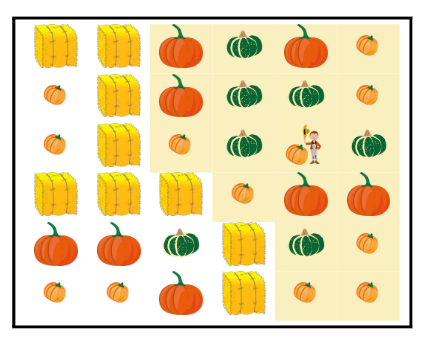10216: CCC '24 J5 - Harvest Waterloo
[Creator : ]
Description
There is a wildly popular new harvest simulation game called Harvest Waterloo. The game is played on a rectangular pumpkin patch which contains bales of hay and pumpkins of different sizes. To begin the game, a farmer is placed at the location of a pumpkin.
The farmer harvests all pumpkins they can reach by moving left, right, up, and down throughout the patch. The farmer cannot move diagonally. The farmer can also not move through a bale of hay nor move outside of the patch.
Your job is to determine the total value of all the pumpkins harvested by the farmer. A small pumpkin is worth \$1, a medium pumpkin is worth \$5, and a large pumpkin is worth \$10 dollars.
The farmer harvests all pumpkins they can reach by moving left, right, up, and down throughout the patch. The farmer cannot move diagonally. The farmer can also not move through a bale of hay nor move outside of the patch.
Your job is to determine the total value of all the pumpkins harvested by the farmer. A small pumpkin is worth \$1, a medium pumpkin is worth \$5, and a large pumpkin is worth \$10 dollars.
Input
The first line of input is an integer $R>0$ which is the number of rows within the patch.
The second line of input is an integer $C>0$ which is the number of columns within the patch.
The next $R$ lines describe the patch. Each line will contain $C$ characters and each character will either represent a pumpkin size or a bale of hay: S for a small pumpkin, M for a medium pumpkin, L for a large pumpkin, or * for a bale of hay.
The next line of input is an integer $A$ where $0≤A<R$, and the last line of input is an integer $B$ where $0≤B<C$. Row $A$ and column $B$ is the starting location of the farmer and the top-left corner of the patch is row 0 and column 0.
The second line of input is an integer $C>0$ which is the number of columns within the patch.
The next $R$ lines describe the patch. Each line will contain $C$ characters and each character will either represent a pumpkin size or a bale of hay: S for a small pumpkin, M for a medium pumpkin, L for a large pumpkin, or * for a bale of hay.
The next line of input is an integer $A$ where $0≤A<R$, and the last line of input is an integer $B$ where $0≤B<C$. Row $A$ and column $B$ is the starting location of the farmer and the top-left corner of the patch is row 0 and column 0.
Output
Output the integer, $V$, which is the total value in dollars of all the pumpkins harvested by the farmer.
Constraints
$R\times C \leq 100,000$
Sample 1 Input
6
6
**LMLS
S*LMMS
S*SMSM
******
LLM*MS
SSL*SS
5
1
Sample 1 Output
37

Starting at row 5 and column 1, the farmer can reach the 6 pumpkins in the highlighted area. They harvest 2 small pumpkins, 1 medium pumpkin, and 3 large pumpkins. The total value in dollars of this harvest is 2×1+1×5+3×10=37.
Sample 2 Input
6
6
**LMLS
S*LMMS
S*SMSM
***SLL
LLM*MS
SSL*SS
2
4
Sample 2 Output
88

Starting at row 2 and column 4, the farmer can reach the 19 pumpkins in the highlighted area. They harvest 8 small pumpkins, 6 medium pumpkin, and 5 large pumpkins. The total value in dollars of this harvest is 8×1+6×5+5×10=88.